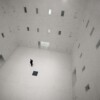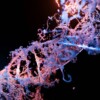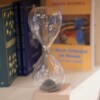I had my first MRI ever just a few months after my 24th birthday. Two days later, I’d undergo an emergency craniotomy to remove as much as possible of a baseball-sized tumor that had, unbeknownst to me, been slowly invading my otherwise healthy brain. I soon received my diagnosis: brain cancer, the slow growing sort…at least for now. I finished a year of treatment and have been on what my doctors call a “watch and wait” protocol ever since. It’s a protocol designed to monitor my post-treatment brain for the disease progression that is sure to come at some point in the future. In the meantime, I’m free to live my life.
I’ve looked at many MRI’s of my brain since that fateful first one—these being the products of the “watching” part of my protocol. The “waiting” part is mostly for me to do. And the question of how I should go about this waiting in light of what exactly I’m waiting for has occupied significant amounts of my attention in the years I’ve spent doing it. I came to terms with my medical diagnosis very early on—almost immediately. I was as about as comfortable as one could be with the changes being “watched” for and the inevitable death we seemed to be “waiting” for, though still far off. Not every day was easy, but God had clearly been at work in the previous years to prepare my mind (meaning my intellect, not my physical brain, obviously—ha!) to receive this diagnosis. I earned my first degree, not used often in my higher education career, in Medicinal and Biological Chemistry. God was also graciously preparing my sister, who became a neuro ICU nurse a few years before my diagnosis, to support me. So, while wrapping my mind around the nature and ramifications of my physical diagnosis was not a cognitive reach, wrapping my heart around it was a different matter. I found myself staring at my MRIs trying to make sense of how these images of my body—my brain no less—could more powerfully reflect the fallenness of creation than the image of God. So, I began to ask the sorts of honest theological questions that God—without judgment—entertains so freely when His children are suffering: What do these images say, if anything, about God—who He is and how He works? What do they say about me? And, where is the hope?
In response to my questions, God took me on a spiritual journey. He used my past schooling to lead me to an understanding of my own diagnosis as determinate, my life as finite, and my physical circumstances as completely and utterly hopeless—no cure on the horizon. I stopped praying for healing and started praying to be made into His likeness.
And surely, God began reorienting my hope as having both its source and its end in Christ alone—no contingencies. This hope, so firmly established in the unchanging character of Jesus, comes with the assurance that His promises regarding a future in which all is redeemed are true. This is a hope far more beautiful and far more consequential than the hope so often transmitted by well-meaning Christians with anemic theologies of suffering. The latter seek to encourage those in the valley of physical ailment with a misguided theology that says, because God can heal, He will heal. And thus, physical healing becomes the litmus test by which man rates the goodness of God and, sometimes, even the faith of those who pray. Such hope—contingent on what God does in the here and now—pays little mind to God’s eternal purposes. This is the hope of this world; it does not last.
Last week, I was working on a project that had nothing to do with my health or my theology. No, I was just looking for some objective psychological justification for why we—as educators—should care to shape our students’ views of the future. In my casual perusing, I happened to stumble across an article titled, Well-being and Anticipation for Future Positive Events: Evidences from an fMRI Study. Intrigued by the researchers’ use of MRIs to speak to matters of pertinence to positive psychology, I started reading. I did not expect God would use it to engage both my mind and my heart.
In the study, the researchers used MRIs to visualize the physical neurological effects of anticipating positive future events. In summary, they offer
The results showed that bilateral medial prefrontal cortex (MPFC) were activated during anticipation for positive events relative to neutral events, and the enhanced brain activation in MPFC was associated with higher level of well-being. The findings suggest a neural mechanism by which the anticipation process to future desired events correlates to human well-being, which provide a future-oriented view on the neural sources of well-being.
In other words, the researchers were able to observe, via functional MRIs, physical changes in the brain’s neural circuitry as a result of participants’ merely anticipating positive future events. Moreover, these neurological changes positively influence individuals’ perceptions of their experiences in the present.
It is not lost on me that this secular paper is, essentially, providing tangible scientific evidence of the physical ramifications of what we, Christians, call hope! What marvelous proof that we, humans created by God, are physically and affectively changed by the hope that we have in Christ and the knowledge of future redemption.
So, I’ll answer my own question: Is there hope in science? Yes and no.
As a source—the answer is a definitive “no.” Science offers me no hope for healing, neither in this life nor in the one to come. In fact, if science gives me any assurance, it is the opposite of hopeful. And still, I know medicine to be a good gift of God, and one through which He works powerfully to grant healing to some in accordance with His will. Even so, the healing—the hope—provided by science is only temporary; it is nothing but a dim representation of the eternal hope available to all in Christ. We must not mistake it for the real thing.
Even so, as I once again looked at MRIs this past week, this time not my own, I found myself pondering the same questions as before: What do these images say, if anything, about God—who He is and how He works? What do they say about me? And, where is the hope?
I was only able to see in my own MRIs reflections of the fall. But, when looking at the MRIs I came across last week, I couldn’t help but see in them evidence of an eternal hope that—fully enlivened by the blessed assurance of a redeemed future—proves consequential for today. The fact that this Kingdom hope is hardwired into our minds is unmistakably a fingerprint of God on man, whom He’s made in His image.
What beauty I have discovered in MRIs this past week. In looking at images of my own brain (structural MRIs) I could not see the image of God that was so obvious in those (functional MRIs) employed by the researchers. Yet, my brain—marred by sin as it is—functionally would appear on an MRI comparable to those studied, in which the image of God was so clear. In other words, had I looked at my brain with a functional rather than a structural MRI—had I been looking for hope in God’s purposes rather than my physical circumstances—perhaps I would have seen that despite the fallenness apparent in the structural scan, the image of God was there in the next, bound up in the neural pathways of an entirely functional, future-oriented hope.
I am becoming more and more convinced that when we care to look closely, science points us to God (to an even greater extent than itself) as our source of true hope. So, there may be some hope in science after all. May we let our hope—the promise of a fully redeemed tomorrow, assured by Christ Himself—change us today, even amidst the brokenness!
























Loved reading this article and the perspective on hope that it gives! Thanks so much for sharing!
Beautifully written, deep and meaningful article reaching for the spiritual walk we all seek in God. Thank you for sharing your experiences!
Such a thoughtful, eloquent article. It’s inspiring to see the insights that you have gleaned from your experiences and your studies.
I resonate a lot with your story. I grew up in a Christian home and have been a Christian my whole life. But I have come to know my Lord in a different way whilst going through some major crisis in life, serious medical issues as well as issues concerning my home and the world around me. It taught me to fully put my trust in Him and nothing else. It was a tough lesson but I would do it all over again if I had to. I hope to share your story with as many people who are willing to hear it!
This is a marvellous article that encourages me to hope in Jesus and his redemptive power to save.. Thank you.